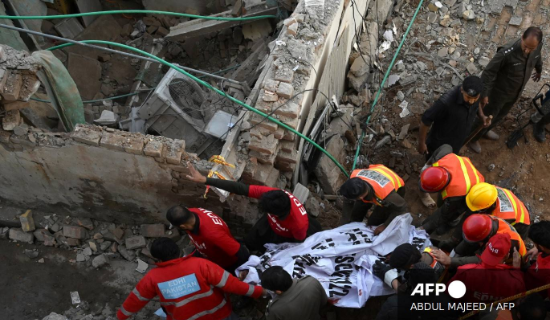Bodies were still being pulled Tuesday from the wreckage of a mosque blast at a police headquarters in northwestern Pakistan that killed more than 80 people and wounded 150 more.
The attack happened during afternoon prayers on Monday in the provincial capital Peshawar, close to areas along the Afghan border where militancy has been steadily rising.
Overnight, at least nine bodies were recovered as rescuers sifted through the rubble of the mosque’s blown out wall and collapsed roof for survivors.
A spokesman for the main hospital in Peshawar, Muhammad Khan, told AFP the toll had risen to 89 as more bodies arrived from the scene. Around 150 more were wounded, officials said.
City police chief Muhammad Ijaz Khan told AFP more than 90 percent of the victims were policemen, between 300 and 400 of whom had gathered in the compound’s mosque for prayers.
“This morning we are going to remove the last part of the collapsed roof so we can recover more bodies, but we are not hopeful of reaching any survivors,” Bilal Ahmad Faizi, a spokesperson for the rescue organisation 1122, told AFP.
At least 20 of the slain police officers were later buried after a prayer ceremony, with coffins lined up in rows and draped in the Pakistani flag.
They were laid to rest with a guard of honour, a police official told AFP.
“Terrorists want to create fear by targeting those who perform the duty of defending Pakistan,” Prime Minister Shehbaz Sharif said in a statement.
– Rising militancy –
The security situation in Pakistan –- once plagued by bombings until a major military crackdown almost a decade ago largely restored order –- has deteriorated since the return of the Afghan Taliban in Kabul.
Analysts say militants have become emboldened, with Islamabad accusing the new rulers of failing to secure their mountainous border, allowing militants to travel back and forth without being detected.
Security forces including police officers have increasingly been the target of low casualty assaults, claimed mostly by the Pakistani Taliban but also by the local chapter of the Islamic State, whose numbers were bolstered by prison breaks inside Afghanistan in 2021.
In a statement, the Pakistani Taliban — separate from the Afghan Taliban but with a similar Islamist ideology — denied it was responsible for the latest blast.
Known as the Tehreek-e-Taliban Pakistan, it has tried to rebrand itself as a less brutal outfit, claiming to avoid targeting places of worship.
The police headquarters in Peshawar is in one of the most tightly controlled areas of the city, housing intelligence and counter-terrorism bureaus, and is next door to the regional secretariat.
Provinces around the country announced they were on high alert after the blast, with checkpoints ramped up and extra security forces deployed, while in the capital Islamabad snipers were posted on buildings and at city entrance points.
The drastic security breach came on the day United Arab Emirates President Mohamed bin Zayed Al Nahyan had been due to visit Islamabad, although the trip was cancelled at the last minute due to bad weather.
Pakistan is also preparing to host an International Monetary Fund delegation on Tuesday as it works towards unlocking a vital bailout loan to prevent a looming default.
UN Secretary-General Antonio Guterres on Monday condemned the blast as “abhorrent”, and US Secretary of State Antony Blinken extended his condolences for the “horrific attack”.








